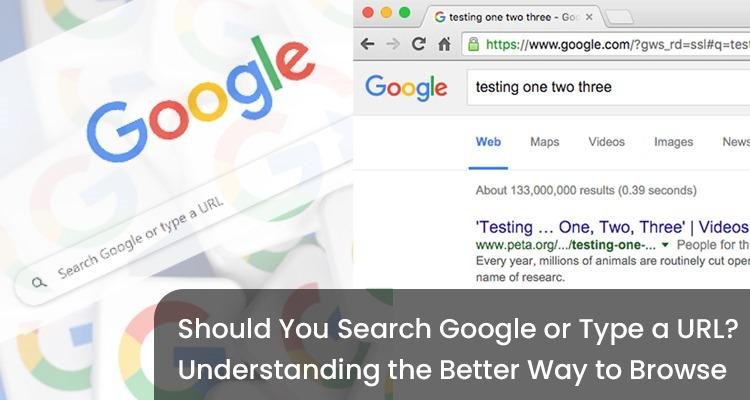Should You Search Google or Type a URL? Understanding the Better Way to Browse

Every time you open your Chrome browser and see the familiar phrase, “Search Google or type a URL,” you’re presented with a small but significant choice. Do you enter the entire web address to travel exactly where you wish to travel, or do you enter a few words and allow Google to transport you there?
At first glance, it doesn’t sound like an enormous decision — but it fundamentally decides how we navigate the entire internet. Expressway or scenic route? In this article, we’ll cover the pros and cons of both methods and help you decide which is best for you depending on your browsing goals.
What Does “Search Google or Type a URL” Actually Mean?
Let’s begin with the basics-
The words “Search Google or enter a URL” are found in what is referred to as the Omnibox — the address and search box all in one in Google Chrome. Here you can either:
- Enter a keyword or query to Google to search for concepts, articles, or websites
- Or simply type in the web address (URL) of a site you already know
Imagine the Omnibox as your personal portal to the web. It’s smart, quick, and adaptable — taking you where you want to go whether you know the address or not.
Two Ways, Two Experiences: Google Search vs URL Typing
It’s ultimately a matter of defining difference: discovery versus direct access.
If you don’t know where you’re headed — maybe a product review, a services business, or this day’s news — you type into Google. But when you do know where you’re going like- reading your mail or your horoscope today at Astropatri— typing in the URL is faster and handier.
Let’s look at them both in more detail.
Option 1: Google Searching — When You Want to Discover
If the world wide web is a city, then Google is the best tour guide. It presents you with possibilities, ranks information based on how relevant it’s likely to be for you, and even guesses what you’re looking for.
Why People Love to Google Search:
1. Best When in Doubt
Don’t know the specific site? Not a problem. Just type in something like “best budget smartphones” or “daily horoscope site” and Google gives you a list of highly recommended ones.
2. Find Something New
Google takes you to thousands of sites — not the major ones alone. You may come across small blogs, useful forums, or expert opinions that you would miss otherwise.
3. Smarter Than You Think
With autocomplete, related searches, and auto-suggested links, Google is faster to complete your thought than you are. It knows what most people are looking for and assists in refining your entry.
4. Perfect for Research
In case you are conducting research — perhaps to compare vehicles or explore AI tools — Google aids you in learning fast by consolidating different perspectives in one location.
But There Are Disadvantages Too:
1. More Steps Involved
You scroll, browse, click — and sometimes repeat that a few times more to get what you really require.
2. Distractions Along The Way
You may wind up clicking on advertisements or get distracted with unrelated results which are alluring but do not really assist.
3. Not Always Appropriate
Even the best sites fail to appear in search. So there is a possibility that the site you desire might not appear unless you scroll around and search for it.
Option 2: Typing a URL — When You Know Exactly Where You’re Going
Other times you simply have to go to a particular location. You know it, you trust it, and you don’t want to sift through results to locate it. That’s when typing in a URL is appropriate.
Why This Approach Succeeds:
1. It is Quick and Explicit
Typing “www.astropatri.com” takes you straight to your favorite astrology gateway — no middle man steps, no guessing.
2. Saves You Time and Data
When you access the source straight, you don’t need to open multiple pages and search pages. This can make your surfing faster and even consume less mobile data.
3. Best for Frequent Visits
If you check the same few websites every day — your mail, bank site, or news site — typing or bookmarking the URL is a breeze.
4. Bypasses SEO Limitations
Some excellent sites might not appear on the first page of search results because they aren’t SEO-optimized. If you know the URL, you won’t miss out.
But Be Aware of the Limits:
1. You Need to Remember the Address
If you misspell the website or get the domain wrong, you could land on an error page or worse, a lookalike phishing site.
2. No Room for Serendipity
Direct URLs get you to one destination. That’s efficient — but it doesn’t expose you to new or potentially better options.
So, What’s the Better Option?
Honestly, neither is better than the other in every situation. Each has its own role, depending on your intent.
- If you’re exploring, comparing, or learning, then searching Google is ideal.
- If you’re visiting a trusted, known site, typing the URL is more efficient.
The key is knowing when to switch between the two — and using them together for a smoother, more productive internet experience.
Bonus: Tips to Make the Most of Your Browser Experience
Whether you search or type, here are some smart ways to enhance your time online.
- Use Search Operators
Want to find something inside a specific website? Use the format:
site:example.com your keyword
For instance,
site:astropatri.com monthly horoscope
This filters search results to just that site.
- Try Voice Search
If you’re on Chrome, tap the mic icon in the address bar and just speak your query. This is especially helpful when you’re multitasking or unsure about spellings.
- Let Autocomplete Work for You
Start typing and let Google finish your thought. Often, it shows you exactly what others are searching — which might be the quickest route to what you need.
Don’t Underestimate the Omnibox
That little search bar at the top of your Chrome browser is more powerful than it looks. Aside from searching and navigating, it can:
- Solve math problems
- Convert currencies or units
- Show the local weather
- Pull up recently visited pages or bookmarks
Think of it as a smart assistant quietly helping you behind the scenes.
Final Thoughts:
Each time you are on the web, you are deciding how you want to interact with the web — directly or by discovery. If you consider Google search as a directional cue and URL typing as a pinpoint instrument, you can navigate more independently and effectively.
The moment you notice “Search Google or type a URL,” remember that it is not a command — it’s an invitation to pick your path. You can take the exploratory path with Google, or jump straight to your favorite destination. Both ways lead to knowledge — it just depends on how you want to get there.
Frequently Asked Questions
1. What is the function of Google URL search?
It allows you to check how Google indexes a particular page and helps webmasters understand how their content is viewed by Google.
2. How can I search inside a specific website?
Use Google’s site search operator. For example, typing site:example.com topic in Google will return Google will return results from that website only.
3. Is it better to search Google or type a URL?
That depends on your need. For direct access, typing the URL is faster. If you’re unsure or want multiple options, search Google.
Content written by-Tanya
Tanya is part of the expert content marketing team at ITCombine. She has an expertise of curating meaningful information that can be used by visitors in general. Tanya is also involved in creating Client specific stories and blogs.
Copyright © 2025 - itcombine.com.
All Rights Reserved.








